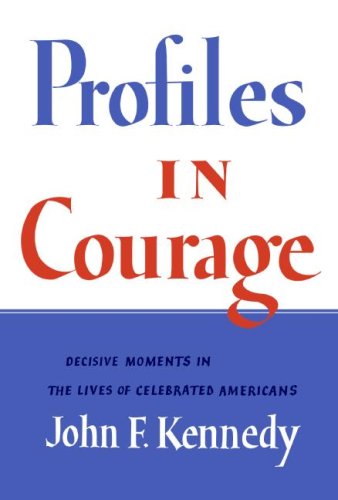
This book attributed to John F. Kennedy contains stirring examples of political courage and integrity.
The dog days of August are upon us.
Here in Chicago Aidan braved scorching temperatures yesterday to stand for hours and watch lots of bands with his friends at Lollapalooza. In an unprecedented move for the summer, we put our room air conditioner on last night as well as the central air system to combat the stifling heat.
In Washington, Congress is on its annual summer recess, leaving representatives to head back to their districts, continue their perennial fundraising and touch base with their constituents who may be displeased with different votes that they have taken.
President Obama’s been in office for six months now, and assessments of his tenure have already begun. Some have noted that president’s signature accomplishments often happen during his first year in office.
For political junkies looking for a fix during these comparatively slow weeks, I recommend reading or re-reading John F. Kennedy’s Profiles in Courage.
Many have written about Kennedy’s dubious authorship of the work-speechwriter Ted Sorensen apparently did much of the heavy lifting-and the rumors that Joe Kennedy leaned on Arthur Krock, his friend, New York Times columnist and committee member, to give his son the award.
Still, the book’s substance holds up well a half century after it was written.
It contains eight profiles of senators who exhibited what Ernest Hemingway famously called “grace under pressure.” For Kennedy, political courage is one what demonstrates when senators act according to their conscience rather than to the popular will and when they act on behalf of the country, rather than in their state’s interests.
Kennedy opens Profiles with a description of the Senate as a body, describing the pressures they are subject to and reminding the reader later in the book that the direct election of senators only came after the 17th Amendment was passed in 1913. He makes the point that senators’ primary loyalty is to their state and gives a feel for the more august and staid temperament of that body compared with that of the House of the Representatives.
The profiles of the individual senators are lively and well-written, containing physical descriptions of the men, a sense of their character, the times in which they lived and the political questions of the day they confronted.
Some of the senators are legendary figures at decisive moments in the nation’s history.
The early section of the book covers the Compromise of 1850, the last-ditch effort to prevent civil war in which Henry Clay, John C. Calhoun and Daniel Webster all figure prominently. Kennedy writes about Webster’s famous speech in which he declared that he was speaking “not as a Massachusetts man, nor as a Northern man but as an American…” before urging the passage of the compromise.
The chapter on Sam Houston was instructive, too. Perhaps best known for his role in the Battle of San Jacinto and role as President of the Republic of Texas, Houston overcame being a slaveholder to fight against Texas’ secession from the Union when the Civil War began.
But other chapters focus on far lesser known figures like Edmund G. Ross, a Republican and neophyte senator who defied his party in 1868 and voted to acquit President Andrew Johnson. His vote, along with others, kept Johnson in office, but, far more important, kept the presidency’s power from being completely gutted by the legislative branch.
Kennedy also includes in the book’s epilogue examples of political courage by figures other than senators, like Illinois Gov. John Peter Altgeld, who sacrificed his political career by pardoning some of the anarchists who participated in the Haymarket Riots.
The edition of the book I read last night also contained speeches by U.S. Rep. John Lewis, who received a Lifetime Profiles in Courage award, and State Rep. Dan Ponder Jr., a 43-year-old conservative Republican and business owner. Just days before he was about the leave the legislature and return to private life, Ponder gave an impassioned speech in which he urged his colleagues to support passage of a hate crimes bill.
In the speech Ponder noted that he was an unlikely person to be taking the position he was, but explained that he was animated by his memory of the time he turned away from Mary Ward, a black woman who was his second mother.
Ponder related that Ward said he did not accept her kiss because she was black, and she was right.
Based on that failure, he later resolved with his wife to raise their children to accept all people and to urge for the passage of the hate crimes bill.
The bill, which had been shelved earlier, passed by a decisive margin.
Ponder’s speech, Lewis’ lifetime of service and the people profiled in the book are reminders that courage has been a presence in American political life.
Kennedy closes the book with the following oft-quoted words:
“In whatever arena of life one may meet the challenge of courage, whatever may be the sacrifices he faces if he follows his conscience – the loss of his friends, his fortune, his contentment, even the esteem of his fellow men – each man must decide for himself the course he will follow. The stories of past courage can define that ingredient – they can teach, they can offer hope, they can provide inspiration. But they cannot supply courage itself. For this each man must look into his own soul.”
Congress resumes work on Tuesday, September 8. We will see then if others emerge with actions that carry on this noble tradition while facing the many challenges of our time.
